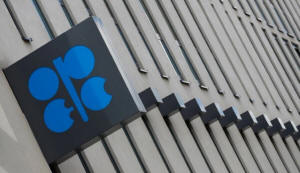|
Saudi struggles for Gulf oil producers'
support ahead of OPEC meeting
 Send a link to a friend
Send a link to a friend
 [June 20, 2018]
By Rania El Gamal, Shadia Nasralla and Ernest Scheyder [June 20, 2018]
By Rania El Gamal, Shadia Nasralla and Ernest Scheyder
VIENNA (Reuters) - Saudi Arabia is
struggling to convince fellow OPEC members including Gulf allies on the
need to raise oil output, sources familiar with the talks said on
Wednesday, adding to complications ahead of an OPEC meeting this week.
The Organization of the Petroleum Exporting Countries meets on Friday to
decide on output policy amid calls from major consumers such as the
United States and China to cool down oil prices and support the global
economy by producing more crude.
Iran said on Tuesday OPEC was unlikely to reach a deal, setting the
stage for a clash with Saudi Arabia and Russia, which are pushing to
raise production steeply from July to meet growing global demand.
Adding to the complications is a lack of compromise among usually
aligned Gulf oil producers ahead of the Friday meeting, according to two
sources familiar with the talks.
For graphic on IEA estimates of non-OPEC supply growth in 2018 click
https://reut.rs/2rJnnCO

For graphic on IEA estimates of global oil demand growth click
https://reut.rs/2Ik645v
For graphic on OPEC compliance in May - Reuters Survey click
https://reut.rs/2JRWnw1
For graphic on balance between global oil supply and demand click
https://reut.rs/2MB4tH3
Traditional Saudi allies - the United Arab Emirates, Kuwait, Oman and
Bahrain - believe Saudi Arabia was too quick to respond to U.S. calls
for higher production, and have been rattled by Riyadh's close
coordination with non-OPEC Russia, sources said.
There are different views on how much to increase production and whether
such a move should be gradual, one source said following a meeting of
Gulf oil ministers on Tuesday evening.
Russia has proposed OPEC and non-OPEC raise output by 1.5 million
barrels per day (bpd), effectively wiping out existing production cuts
of 1.8 million bpd that have helped rebalance the market in the past 18
months and lifted oil to $75 per barrel. Oil was trading as low as $27
in 2016.
OPEC members Iran, Iraq, Venezuela and Algeria have opposed a relaxation
of production cuts, fearing a slump in prices.
But OPEC could still agree a last-minute deal on Friday by compromising
on a lower output increase below 1 million bpd, OPEC sources have said.
A senior Iranian official said on Wednesday that OPEC should maintain
its existing deal to cut oil supply until the end of 2018, maintaining
Iran's opposition to increasing supplies.

[to top of second column]
|

The logo of the Organization of the Petroleoum Exporting Countries
(OPEC) is seen at OPEC's headquarters in Vienna, Austria June 19,
2018. REUTERS/Leonhard Foeger

"We have a valid deal," Iran's OPEC governor Hossein Kazempour
Ardebili said, responding to a question whether the agreement would
be adjusted on Friday. OPEC's supply-cutting pact runs until the end
of 2018.
Saudi Energy Minister Khalid al-Falih, asked whether he expected an
easy meeting on Friday, said: “We will find out. Stay tuned.”
CONVINCING IRAN
A decision to increase output could be taken with Iran refusing to
sign up, as has happened before in OPEC.
Iran has so far been the main barrier to a deal, with Oil Minister
Bijan Zanganeh saying on Tuesday OPEC should not yield to pressure
from U.S. President Donald Trump to raise output.
He said Trump had contributed to the rise in prices by imposing
sanctions on OPEC members Iran and Venezuela, which will likely lead
to lower exports.
Zanganeh said he would leave Vienna on Friday even before OPEC holds
talks with non-OPEC producers the next day, but efforts were
underway on Wednesday to convince Iran to participate in a deal.
Sources said Saudi Arabia did not want to be seen as putting too
much pressure on Iran and hence Russia could instead try to convince
Tehran.
Zanganeh was due to attend a ministerial committee on Thursday, two
sources said. Iran is usually not part of the committee, which
includes Russia, Saudi Arabia, the UAE, Oman, Kuwait, Algeria and
Venezuela.

Iraqi Oil Minister Jabar al-Luaibi said on Wednesday he hoped there
would be agreement when OPEC meets but added: "The oil market has
not reached the level of stabilization."
(Additional reporting by Alex Lawler, Ahmad Ghaddar, Vladimir
Soldatkin; Writing and editing by Dale Hudson and Dmitry Zhdannikov)
[© 2018 Thomson Reuters. All rights
reserved.]
Copyright 2018 Reuters. All rights reserved. This material may not be published,
broadcast, rewritten or redistributed.
Thompson Reuters is solely responsible for this content. |